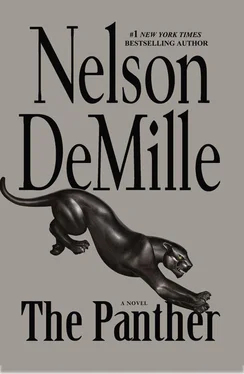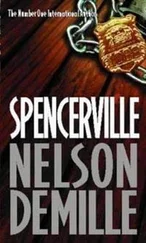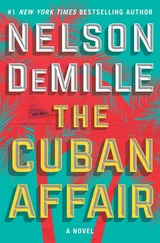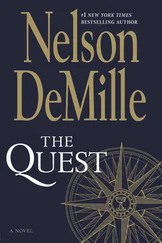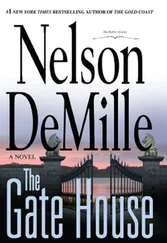Nelson Demille - The Panther
Здесь есть возможность читать онлайн «Nelson Demille - The Panther» весь текст электронной книги совершенно бесплатно (целиком полную версию без сокращений). В некоторых случаях можно слушать аудио, скачать через торрент в формате fb2 и присутствует краткое содержание. Жанр: Триллер, на английском языке. Описание произведения, (предисловие) а так же отзывы посетителей доступны на портале библиотеки ЛибКат.
- Название:The Panther
- Автор:
- Жанр:
- Год:неизвестен
- ISBN:нет данных
- Рейтинг книги:5 / 5. Голосов: 1
-
Избранное:Добавить в избранное
- Отзывы:
-
Ваша оценка:
- 100
- 1
- 2
- 3
- 4
- 5
The Panther: краткое содержание, описание и аннотация
Предлагаем к чтению аннотацию, описание, краткое содержание или предисловие (зависит от того, что написал сам автор книги «The Panther»). Если вы не нашли необходимую информацию о книге — напишите в комментариях, мы постараемся отыскать её.
The Panther — читать онлайн бесплатно полную книгу (весь текст) целиком
Ниже представлен текст книги, разбитый по страницам. Система сохранения места последней прочитанной страницы, позволяет с удобством читать онлайн бесплатно книгу «The Panther», без необходимости каждый раз заново искать на чём Вы остановились. Поставьте закладку, и сможете в любой момент перейти на страницу, на которой закончили чтение.
Интервал:
Закладка:
I actually saw that when I was there. I thought it was a statue of Elton John in drag.
Buck continued, “When the British left, South Yemen became Marxist-the only Communist Arab country in the world.” He added, “You’ll also see some vestiges of the Soviet presence in Aden during this period, such as ugly architecture, black-market vodka, and a Russian nightclub that features Russian strippers and prostitutes.”
Address?
Buck continued, “During this period, there were a series of wars between the north and south, alternating with reunification talks. With the collapse of the Soviet Union, the Russians left and unification was achieved, but then the south changed its mind and waged a new war of secession, which failed and led to the present reunification.”
Who’s on first?
Buck further informed us, “I was in Sana’a and Aden during this period. It was a very bloody time and the scars remain.” He added, “Yemenis have become used to war, which has led to a sort of national psychosis, and which is why Yemen is an armed camp.”
I glanced at Kate, who seemed to be getting that Yemen wasn’t the Switzerland of the Mideast.
Buck continued, “During the first Gulf War, Yemen sided with Saddam Hussein, which annoyed their large and powerful neighbor of Saudi Arabia. The Saudis retaliated by expelling a few hundred thousand Yemeni guest workers.”
Who are now in Brooklyn.
Buck continued, “The Saudis and Yemenis are currently engaged in a border dispute.” He explained, “They share a long border including the area of Ar Rub al Khali, what is called the Empty Quarter, an uninhabited expanse of scorching desert and shifting sands.” He added, “This area includes the border province of the Hadhramawt, which means ‘the Place Where Death Comes.’ ”
The Yemen tourist board should really think about renaming that. I mean, the Empty Quarter is bad enough, but Death Comes is not a winner.
I asked Buck, “And the loser of the border dispute has to keep this place?”
“There is oil there,” Buck answered, then continued. “It is a porous, ill-defined border and a suspected crossing point of AQAP-Al Qaeda in the Arabian Peninsula.”
Right. Maybe that’s where The Panther had a shoot-out with Saudi soldiers. I’m glad I didn’t have to go there. Right?
Buck concluded, “This brief history brings us to the Cole bombing in October 2000. Since then, as you well know, the U.S. has gained a foothold in Yemen, but it is a very tenuous foothold and our mission there could end suddenly if the Yemenis have a change of heart or a change of government.”
That would be nice.
Buck took an ornate curved dagger out of his briefcase, which he unsheathed as he said, “I can cut your throat with this.”
Not if I get to my gun first, Buck.
He smiled and said, “But only if you fall asleep.” He informed us, “This is called a jambiyah, and it’s worn by most men in Yemen. You can buy a jambiyah at a souvenir stand for about three dollars, but the ones made by artisans can cost thousands of dollars. This one is an antique with semi-precious stones and a rhinoceros-horn handle, and is worth about five thousand dollars. According to the last owner, it has been used to kill at least six people.”
Buck advised us, “Never ask to see a man’s jambiyah.” He explained, “A man only unsheathes his jambiyah if he is going to use it.”
He continued, “There is an old Arab war song”-he didn’t sing, but recited-“ ‘Terrible he rode alone, with his Yemen sword for aid; ornament it carried none, but the notches on the blade.’ ”
Right. I’d actually heard those words before, from a guy named Gabe Haytham, an Arab-American on the Task Force, when I was working the case of Asad, The Lion.
Buck was going on now about religion-ninety-eight percent of the country was Muslim, the rest were Christians, Jews, and Hindus. He said, “Before the creation of Israel in 1948, the Sana’a government tolerated its Jews, who are part of their heritage from the days of King Solomon and the Queen of Sheba. In fact, many Yemenis were Jewish until the arrival of Islam.”
Maybe that explains the Yemeni delis in Brooklyn.
He informed us, “Most of the Jews fled to Israel after 1948.” He continued, “The Yemeni constitution supposedly provides for religious freedom for minorities, but there are no churches or synagogues remaining where you can attend services.” He added, “As in most Islamic countries, the conversion of a Muslim to another religion is prohibited, and punishable, usually by death.” He warned us, “Do not proselytize. It’s a capital offense. Though you may quote from the Old and New Testaments, which Muslims consider sacred texts. But try to learn a few passages from the Koran as well.”
“Which Korean?”
“The Koran , Mr. Corey.”
“Right.”
Buck continued, “Yemenis speak Arabic, including ancient dialects. Yemeni Arabic is considered the most pure form of the language-unchanged for thousands of years because of the isolation of the country. Many Arabic-language scholars, including Westerners, go to Yemen to study the language. Think of Yemeni Arabic as Shakespearean English, though it is much older.”
I asked Buck, “Do you speak Arabic?”
He replied in Arabic, and I said, “That’s easy for you to say.”
Kate accidentally kicked me under the table.
Buck said, “Sex.”
I sat up.
“Sex,” he repeated. “We all know or think we know about the Muslims’ attitude toward sex, so I won’t repeat all that you’ve heard, but I’ll recap. Sex outside of marriage is forbidden, and adultery is punishable by death.”
“Right. Screw the divorce lawyers. Get that jambiyah sharpened.”
Buck smiled and said, “That shouldn’t be a concern for a happily married couple.”
Correct, but I had to ask, “Do guys get the death penalty for screwing around?”
“Not usually, but-”
Kate interrupted, “They do with me.”
“Just asking.”
Buck also informed us, “Homosexuality is often punished by death, but rape is usually settled with a cash payment to the victim’s family. But if the rapist claims the sex was consensual, which they always do, then the victim, if she can’t produce four witnesses to the contrary, is sometimes killed by her family. What they call honor killings.”
Okay, we knew all of this, but it was jarring to hear it.
Buck next discussed marriage and family. “Polygamy is legal under Islamic law, and a man may have up to four wives, but polygamy is not common in Yemen.”
“Why not?” Kate asked.
Because what guy wants four women telling him to take out the garbage?
“Because,” said Buck, “most men can’t afford more than one wife.”
Most men, Buck, can’t afford one wife.
Buck continued, “Most marriages are arranged.”
I asked, “Do they have Match.com?”
“Yes, but the women in the photos are all veiled and they have no hobbies, interests, jobs, or education.”
Funny. I liked Buck. Even Kate laughed.
Buck informed us, “Custom regards the ideal marriage as a marriage between cousins.”
Like in Kentucky.
“Women are viewed as subordinate and must serve their fathers, husbands, brothers, and even their male children.”
This might be a good year.
Buck said, “The Yemeni constitution states that women are equal to men, but then incorporates many aspects of Sharia law, which negates that equality. For instance, in a court of law, the testimony of one man equals that of two women.”
My lawyer wife asked, “How can they call that equal?”
I volunteered, “Buck just told you. One equals two. Do the math.”
Читать дальшеИнтервал:
Закладка:
Похожие книги на «The Panther»
Представляем Вашему вниманию похожие книги на «The Panther» списком для выбора. Мы отобрали схожую по названию и смыслу литературу в надежде предоставить читателям больше вариантов отыскать новые, интересные, ещё непрочитанные произведения.
Обсуждение, отзывы о книге «The Panther» и просто собственные мнения читателей. Оставьте ваши комментарии, напишите, что Вы думаете о произведении, его смысле или главных героях. Укажите что конкретно понравилось, а что нет, и почему Вы так считаете.
